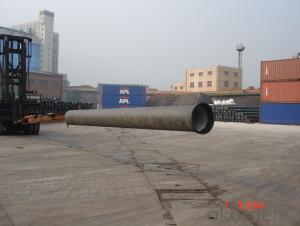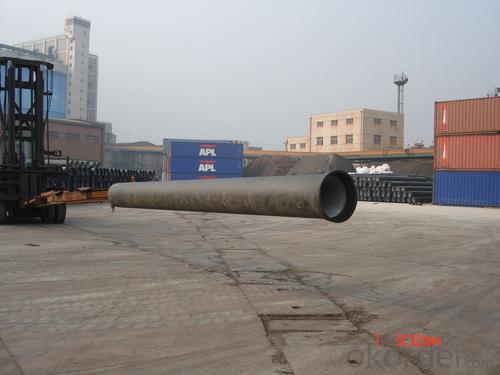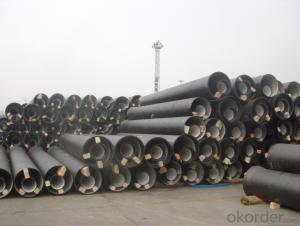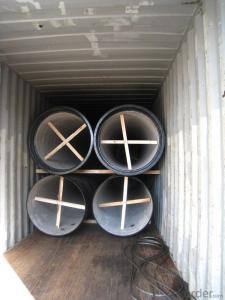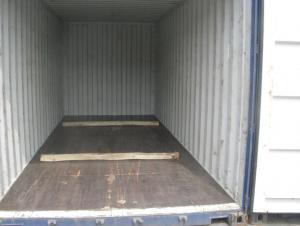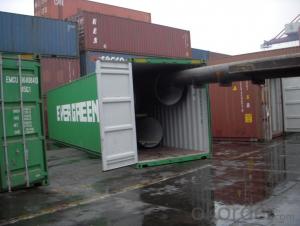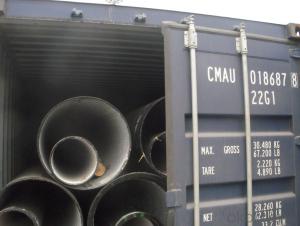DUCTILE IRON PIPES AND PIPE FITTINGS k8 CLASS DN1600
- Loading Port:
- Tianjin
- Payment Terms:
- TT OR LC
- Min Order Qty:
- 22 pc
- Supply Capability:
- 3000 pc/month
OKorder Service Pledge
OKorder Financial Service
You Might Also Like
Material : Ductile Cast Iron
Size Range : DN 80mm to DN 2000mm
Unit Effective Length : 6m or 5.7m
Manufacture Standard: ISO 2531:1998/ EN 545:2006/EN 598:2007
Annual capacity : 200,000 tons
Coating Exterior: Zinc 130g/m2 according to ISO 8179-1 and bitumen coating 70 microns.
Cement Interior: Portland Cement/ High Alumina Cement/ Sulphate Resisting Cement Lining according to ISO 4179
Special requirements on external coating and internal lining can be applied
We also provide accessories such as SBR/EPDM rubber gaskets, lubricant paste, pipe caps, PE sleeves, etc.
Additional Parts:
Each pipe is strictly inspected according to related standard to ensure permanently high performance.
Easy Installation at site and service free for life
Long Service Lifespan
Quotation will arrive you within 24hours once we get your inquiry.
We guarantee offering you a competitive price.
A copy of original inspection reports of pipes will be offered after shipment.
Photos of loading process will be sent to the customer after shipment effect.
We will follow-up the delivery progress after shipment effect and update to the customer on weekly basis.
- Q: Do ductile iron pipes require internal lining for potable water applications?
- Yes, ductile iron pipes do require internal lining for potable water applications. This is because the iron used in these pipes can react with the water and potentially contaminate it. Internal lining acts as a barrier between the water and the iron, preventing any chemical reactions and ensuring the water remains safe for consumption.
- Q: How does ductile iron pipe perform in seismic areas?
- Ductile iron pipe performs exceptionally well in seismic areas due to its inherent strength and flexibility. Seismic activity can subject pipelines to significant ground movements and vibrations, and ductile iron pipes have proven to be highly resilient in such conditions. The unique properties of ductile iron, including its high tensile strength and ductility, allow it to absorb the energy generated during seismic events. This ability to flex and bend without breaking or fracturing makes it an excellent choice for areas prone to earthquakes. Furthermore, ductile iron pipes are designed and manufactured to withstand external forces and ground movements. They are often installed with flexible joints that can accommodate ground shifts and maintain the integrity of the pipeline system. These joints can absorb lateral and angular movements, reducing the risk of pipe failure. Additionally, ductile iron pipes have a long history of successful performance in seismic areas. They have been extensively tested and proven to meet or exceed industry standards for seismic resistance. This reliability is crucial in ensuring the safety and functionality of water and wastewater systems, even in the event of a seismic event. Overall, ductile iron pipe is a reliable and durable choice for pipelines in seismic areas. Its ability to withstand ground movements, its flexibility, and its proven track record make it an excellent option for ensuring the integrity and functionality of water and wastewater systems in earthquake-prone regions.
- Q: What is the average weight of ductile iron pipes?
- The average weight of ductile iron pipes varies depending on their size and specifications. Generally, ductile iron pipes can range in weight from a few hundred pounds to several tons per linear foot.
- Q: What does ductile iron pipe "K" mean?
- 1 、 pipe fittings are K type, T type, etc.;2 wall thickness registration symbol. For example, according to the pipe quality standards GB/T13295-K9, which is the wall thickness ofK=9* (DN/1000+0.5)
- Q: Can ductile iron pipes be used for geothermal heating and cooling systems?
- Yes, ductile iron pipes can be used for geothermal heating and cooling systems. Ductile iron is a strong and durable material that can withstand the high temperatures and pressures associated with geothermal systems. It has excellent corrosion resistance, which is crucial for long-term performance in underground applications such as geothermal systems. Furthermore, ductile iron pipes have high thermal conductivity, allowing for efficient heat transfer in geothermal systems. Overall, ductile iron pipes are a suitable choice for geothermal heating and cooling systems due to their strength, durability, corrosion resistance, and thermal conductivity.
- Q: Can ductile iron pipes be used for conveying gases?
- Yes, ductile iron pipes can be used for conveying gases. Ductile iron is a strong and durable material that can withstand high pressure and temperature variations, making it suitable for transporting gases. Additionally, ductile iron pipes have excellent corrosion resistance, which is important when dealing with potentially corrosive gases. However, it is crucial to ensure that the specific type of gas being conveyed is compatible with ductile iron to prevent any chemical reactions or damage to the pipes. Proper engineering design and material selection should be considered to ensure the safe and efficient conveyance of gases through ductile iron pipes.
- Q: What are the different methods for cutting ductile iron pipe?
- The cutting of ductile iron pipe can be done in various ways, depending on the project's specific needs and limitations. Some commonly used methods include: 1. Manual Cutting: To cut through the ductile iron pipe, one can employ a handheld saw or grinder equipped with an abrasive cutting wheel. While this method is simple and cost-effective, it can be laborious and time-consuming for larger pipe sizes. 2. Mechanical Cutting: Specialized machinery, such as bandsaws, pipe cutters, or hydraulic cutting machines, can be utilized to mechanically cut through the ductile iron pipe. These machines offer faster and more precise cuts, especially for larger pipe sizes. However, they tend to be more expensive and require skilled operators. 3. Torch Cutting: Also known as oxyfuel cutting, torch cutting involves heating the ductile iron pipe using a torch and then introducing a high-pressure oxygen stream to facilitate a chemical reaction that cuts through the metal. This method is effective for thick-walled ductile iron pipes but necessitates proper safety precautions due to the significant heat and sparks it generates. 4. Plasma Arc Cutting: The utilization of a high-velocity jet of ionized gas (plasma) to melt and cut through the ductile iron pipe characterizes plasma arc cutting. This method is ideal for precision and efficiency when cutting through thick-walled pipes. However, it can be more costly and may require specialized equipment and training. 5. Waterjet Cutting: Waterjet cutting involves using a high-pressure jet of water mixed with an abrasive material to cut through the ductile iron pipe. This method offers high precision and does not generate heat or sparks, making it suitable for sensitive environments. However, it tends to be slower and more expensive compared to other cutting methods. When selecting the appropriate method for cutting ductile iron pipe, factors such as pipe size, project requirements, budget, and safety must be taken into consideration. Consulting professionals or experts in the field can assist in determining the most suitable method for a specific project.
- Q: Are ductile iron pipes suitable for use in agricultural applications?
- Yes, ductile iron pipes are suitable for use in agricultural applications. Ductile iron pipes are known for their high strength and durability, making them ideal for withstanding the heavy loads and pressures often found in agricultural operations. Additionally, they have excellent corrosion resistance, which is important in agricultural environments where pipes may be exposed to chemicals or fertilizers. Ductile iron pipes also have a long lifespan, reducing the need for frequent replacements and minimizing maintenance costs. Overall, their robust nature and ability to handle various agricultural demands make them a reliable choice for use in agricultural applications.
- Q: What is the DN400 installation charge for ductile iron pipes?
- The wages paid under special circumstances: refers to the provisions of the state laws, regulations and policies, due to illness, injury, maternity leave, family planning leave, funeral leave, leave, leave, leave, regular shutdown, implementation of national or social obligations due to pay a certain percentage of wage hourly wage or salary when.
- Q: What is the difference between cast iron pipe and seamless steel pipe and galvanized steel pipe?
- Seamless steel pipe: a pipe with a hollow cross section, used as a conduit for transporting fluids, such as pipelines for transporting petroleum, natural gas, gas, water, and certain solid materials. Compared withsteel and roundsteelinsolid, flexural torsional strength in the same time, the weight is light, is a kind of economic section steel, widely used in the manufacture of structural parts and mechanical parts, such as the oil pipe, automobile transmission shaft, the bicycle frame and steel construction with scaffold with steel pipe manufacturing ring parts can be improved the utilization rate of materials, simplify the manufacturing process, material saving and working hours, has been widely used to manufacture steel tube.
Send your message to us
DUCTILE IRON PIPES AND PIPE FITTINGS k8 CLASS DN1600
- Loading Port:
- Tianjin
- Payment Terms:
- TT OR LC
- Min Order Qty:
- 22 pc
- Supply Capability:
- 3000 pc/month
OKorder Service Pledge
OKorder Financial Service
Similar products
Hot products
Hot Searches
Related keywords
